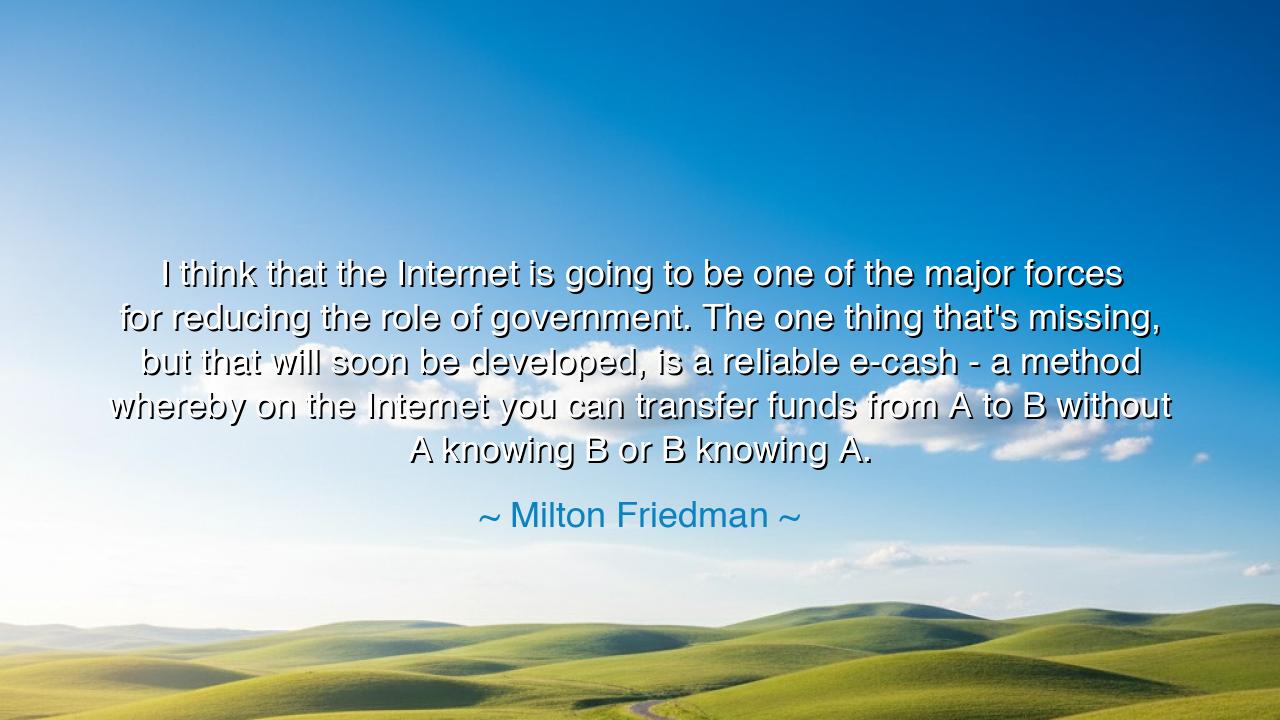
I think that the Internet is going to be one of the major forces
I think that the Internet is going to be one of the major forces for reducing the role of government. The one thing that's missing, but that will soon be developed, is a reliable e-cash - a method whereby on the Internet you can transfer funds from A to B without A knowing B or B knowing A.






"I think that the Internet is going to be one of the major forces for reducing the role of government. The one thing that's missing, but that will soon be developed, is a reliable e-cash — a method whereby on the Internet you can transfer funds from A to B without A knowing B or B knowing A." – Milton Friedman
In these prophetic words, Milton Friedman, one of the greatest economists of the twentieth century, glimpsed the coming revolution of digital freedom. Spoken long before the rise of Bitcoin or blockchain, his statement reveals not only an economist’s logic but a visionary’s foresight. Friedman, a defender of free markets and individual liberty, saw in the Internet a tool that could shatter the traditional boundaries of government control. He understood that information and exchange, when liberated from bureaucracy, have the power to create a world where individuals can transact freely—without surveillance, without permission, without the invisible hand of the state directing their every move.
The origin of this quote lies in Friedman’s broader philosophy of economic freedom. Throughout his career, he argued that the greatest threat to prosperity was not poverty itself, but centralized control. He believed that governments, though necessary in some functions, inevitably expand beyond their purpose, choking innovation and liberty with regulation and inflation. When Friedman looked at the dawn of the Internet in the 1990s, he saw more than a communication tool; he saw the birth of a new economic frontier—a digital marketplace without borders. The only missing ingredient, he said, was a form of digital money—anonymous, decentralized, and secure—a concept that decades later would be realized in cryptocurrency.
To understand the power of his insight, one must recall the ancient struggle between state and individual. In every age, rulers have sought to control the flow of money, for where money flows, power follows. The invention of coinage gave kings the power to tax; the rise of banks gave governments the power to monitor; and the creation of fiat currency gave them the power to print. But the Internet—borderless and ungovernable—promised to return some of that power to the people. Friedman foresaw that once a trustless system of exchange emerged, it would weaken the monopoly of states over currency, taxation, and economic behavior. His dream was not rebellion, but restoration: the restoration of economic autonomy to the individual.
History has already begun to prove him right. In 2009, long after Friedman’s death, Bitcoin emerged—a digital currency based on cryptographic proof rather than trust in institutions. Its anonymous and decentralized nature mirrored exactly what Friedman described: funds transferred from A to B, without A knowing B or B knowing A. Bitcoin and its successors became the modern embodiment of Friedman’s “e-cash”, and with them came an entire movement toward decentralized finance (DeFi), blockchain governance, and the reimagining of property and exchange in the digital age. Though imperfect and volatile, these innovations carry the spirit of Friedman’s vision—a world where voluntary exchange replaces coercive control.
Yet Friedman’s words carry not only promise, but warning. He knew that governments, once threatened, would resist their loss of control. For every innovation that liberates, there arises an authority seeking to regulate it. Thus, the struggle continues: privacy against surveillance, decentralization against monopoly, individual freedom against institutional oversight. The birth of e-cash is not merely technological—it is philosophical. It asks humanity to decide whether it trusts the judgment of free individuals or the dictates of centralized power.
At the heart of his message lies a timeless moral truth: freedom and responsibility are inseparable. If individuals wish to escape the control of government in the digital realm, they must also cultivate integrity in their transactions. Anonymity without ethics breeds chaos, just as control without freedom breeds tyranny. The future Friedman envisioned—one of private, peer-to-peer exchange—depends not merely on algorithms, but on the moral strength of the people who use them. The balance between liberty and virtue will determine whether e-cash becomes a tool of empowerment or exploitation.
The lesson, then, is profound: technology alone cannot create freedom—it can only enable it. The Internet and digital currencies are instruments, but the music they play depends on the hands that wield them. Economic freedom, as Friedman taught, is not the absence of government, but the presence of choice. To live by his vision is to embrace innovation while defending privacy, to champion transparency in institutions but discretion in individuals, and to use technology not as an escape from responsibility, but as an expansion of opportunity.
And so, the practical actions are these: learn the systems that govern your money, understand the tools of digital exchange, and protect your right to privacy as fiercely as you protect your freedom of speech. Support innovation, but demand accountability; value independence, but temper it with ethics. For as Milton Friedman foresaw, the Internet would indeed change the world—but only those who pair freedom with wisdom will truly master it.






AAdministratorAdministrator
Welcome, honored guests. Please leave a comment, we will respond soon